Kukicha tea, also known as twig tea or bōcha, is a unique Japanese green tea made from the stems, stalks, and twigs of the tea plant. This distinctive tea offers a range of potential health benefits, a history deeply rooted in Japanese culture and some considerations regarding its consumption. This blog will help you explore eight key Kukicha tea benefits, delve into its side effects, and uncover its rich historical significance.
What Is Kukicha Tea?
Kukicha is a Japanese green tea, often recognized in English as “stem tea” or “twig tea.”
Kukicha tea is made from the parts of the Camellia sinensis tea plant, a species of evergreen shrubs or small flowering trees whose leaves and buds are used to make black tea, oolong tea, green tea, white tea, and pu-erh tea.
In contrast to other teas, Kukicha is made solely using the tea plant’s stems and twigs, not the leaves.
Originating as a tea for more impoverished populations, the creation of twig tea stemmed from humble, working roots.
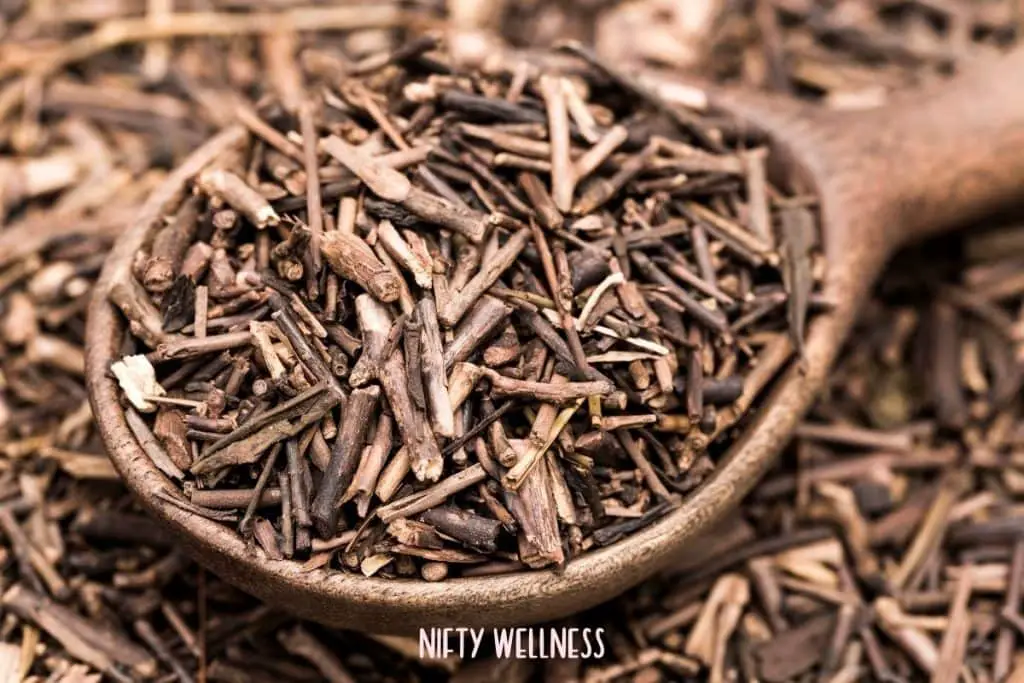
The stems and stalks of the C. sinensis tea plant were discarded during the production of other teas; seeing the waste, workers began to save the twigs in order to brew a cheaper version of green tea.
Most of the stems used to produce Kukicha are several years old, deeming it the “three-year tea.” As a result of this aging, twig tea contains significantly less caffeine than other green teas, but it has many other health benefits and nutrients.
Check out our latest blog Health Benefits of Tea: Sip Your Way to a Healthy Lifestyle. Get insights about how from stress reduction to improved heart health, tea is your daily dose of wellness.
Kukicha Tea Benefits

Kukicha is a unique green tea that benefits the body in numerous ways. Kukicha tea comes with a variety of potential health perks. Thanks to its special blend, it’s lower in caffeine compared to typical green teas, making it a great option for a mild energy boost. Packed with antioxidants, Kukicha offers defense against oxidative stress and is thought to aid in weight management and digestion. Additionally, its alkaline properties may assist in maintaining a balanced body pH, promoting overall wellness. Plus, its light, nutty flavour makes Kukicha tea a delightful addition to your daily tea routine.
Low In Caffeine
Kukicha tea is a great choice for those looking to reduce caffeine intake. Kukicha tea is naturally low in caffeine, making it a suitable drink for anyone looking to enjoy the benefits of green tea, and it can be had at any time of the day. It is a gentle option for people sensitive to caffeine or prefer a milder energy boost. This characteristic allows you to enjoy a cup of Kukicha without the jittery effects of higher-caffeine beverages.
Nutrient-Dense
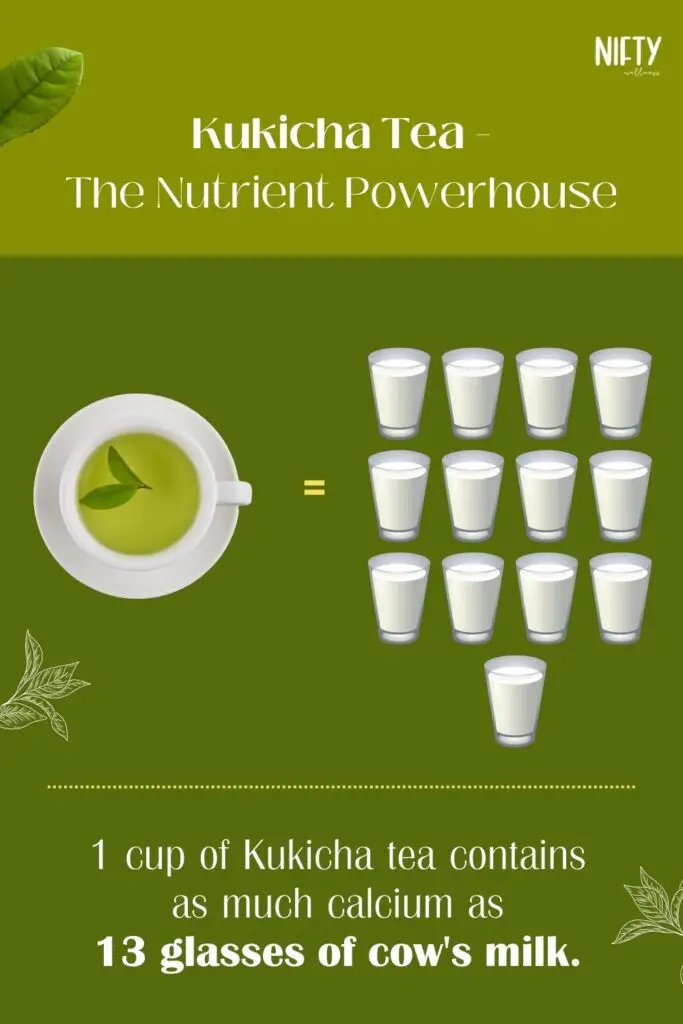
Kukicha tea is full of health-boosting nutrients such as A, C, B-complex vitamins and minerals such as copper, selenium, manganese, zinc, and calcium.
Kukicha’s calcium content is one of its most unique properties, as one cup of Kukicha tea contains as much calcium as 13 glasses of cow’s milk.
Regular calcium consumption has been linked to supporting strong, healthy bones and teeth.
High In L-Theanine
L-theanine, an amino acid commonly found in tea, is naturally produced in the roots of a plant before making its way to the leaves. Therefore, Kukicha contains high levels of this amino acid, which has shown several promising health benefits.
One researched benefit of L-theanine is its ability to induce feelings of calm, reducing anxiety and stress without promoting feelings of drowsiness.
L-theanine was shown to significantly moderate brain activity and enhance alpha brain wave activity, which achieved a relaxed yet alert influence on the central nervous system.
High In Antioxidants
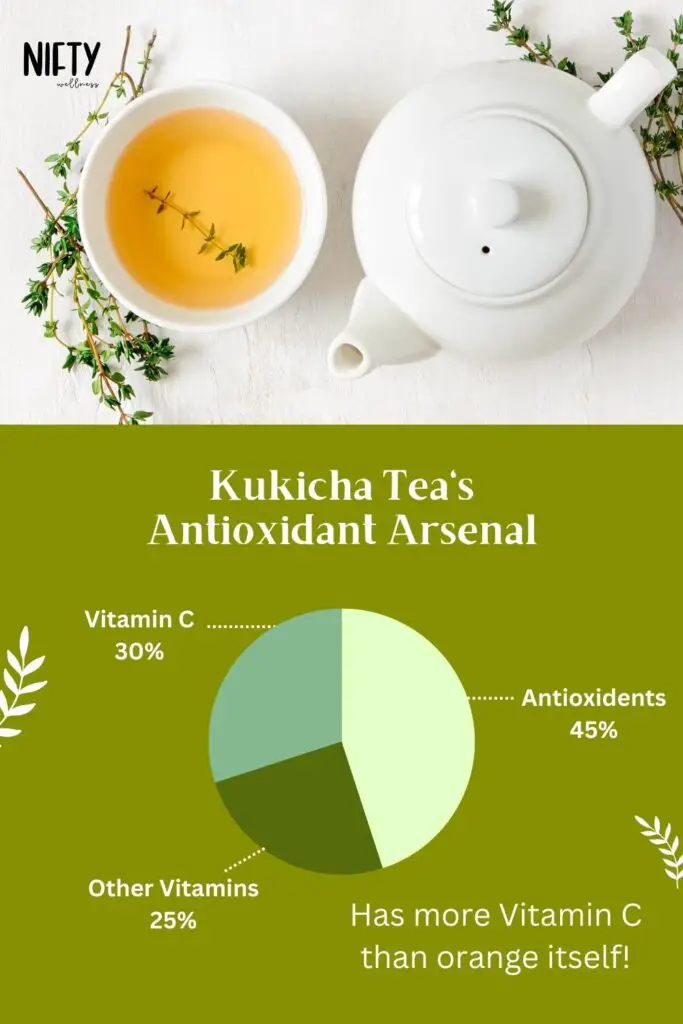
Kukicha tea is also high in antioxidants such as polyphenols and their subset tannins. Polyphenols have been correlated with a variety of health benefits, in part due to their antioxidant powers.
Kukicha green tea also contains 2.5x more Vitamin C than oranges.
Vitamin C is a potent antioxidant known for protecting the immune system, benefiting skin and eye health, and reducing one’s risk of chronic diseases linked to oxidative stress and cellular damage.
Reduces Risk Of Chronic Disease
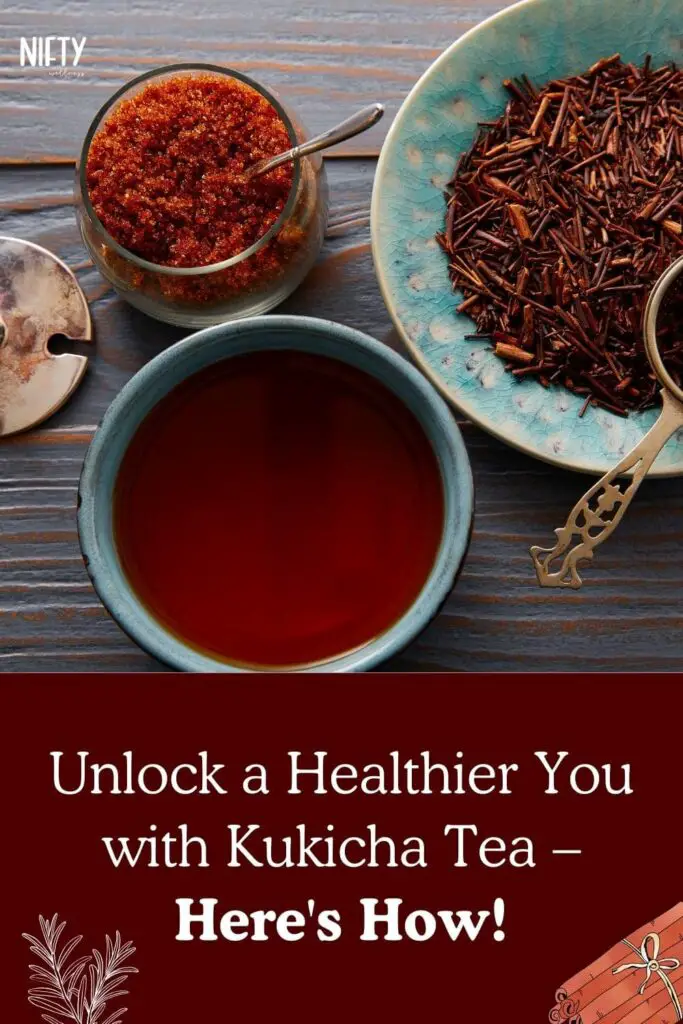
One important polyphenol found in green teas like Kukicha is the widely-studied flavonoid Epigallocatechin Gallate or EGCG.
Decades of research have connected EGCG with lower disease risks such as cancer, heart disease, and neurodegenerative diseases.
In recent years, continued research has shown positive links between EGCG and the inhibition and destruction of cancer cells.
In addition, green tea like Kukicha contains high levels of a tannin known as ellagitannin. This polyphenol has anti-inflammatory and antioxidant effects that reduce damage in the body and curb the development of chronic diseases.
One 2016 study found ellagitannins to be powerful phytochemicals that show chemopreventive and anti-cancer activities.
Benefits Digestion
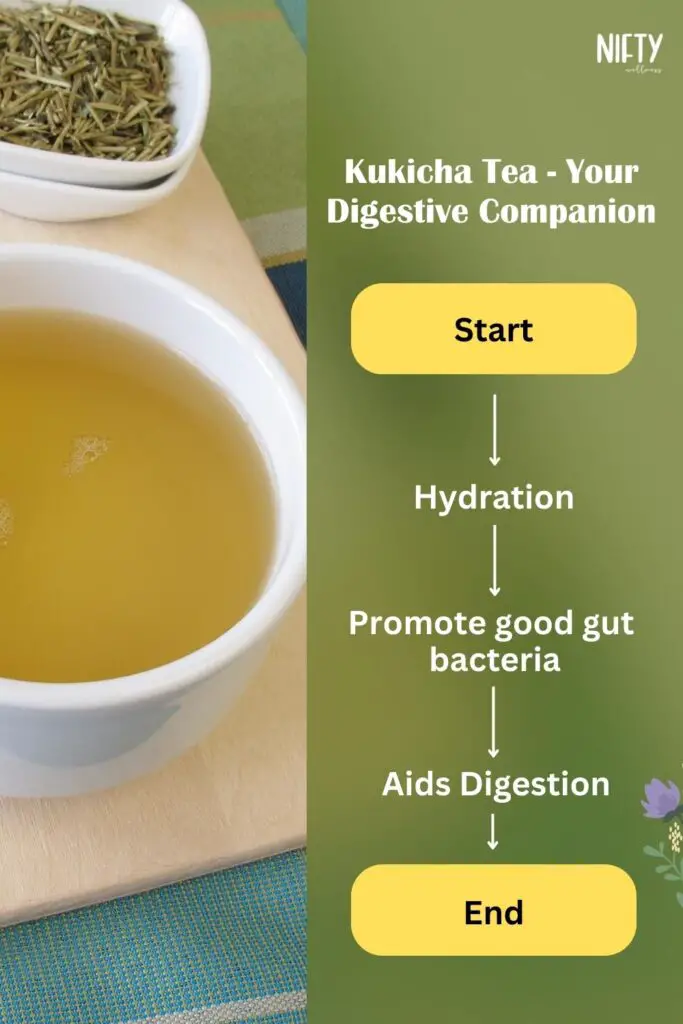
Kukicha tea offers several health benefits, making it a valuable addition to your tea collection. This tea is rich in antioxidants, which help protect your body against oxidative stress. Drinking Kukicha tea during the day will keep you hydrated and benefit your overall digestion.
Even more so, Kukicha’s high levels of ellagitannin may promote the growth and healthy activity of good gut bacteria that aids in digestion, according to this 2019 study. With its light, nutty flavour, Kukicha tea nourishes and delights your taste buds as part of your daily tea routine.
Naturally Alkalizing
Kukicha tea has a naturally alkalizing effect on the body that lowers acidity, in part due to its high levels of calcium and other minerals. This can help balance the body’s pH levels. An alkaline environment in the body is associated with various health benefits, including reduced risk of chronic diseases and better overall well-being. Consuming alkaline foods and beverages like Kukicha tea can contribute to maintaining this balance.
While more studies are needed on the benefits of alkalinity and the body, certain research suggests that a lower-acid diet may improve some chronic diseases.
Supports Dental Health
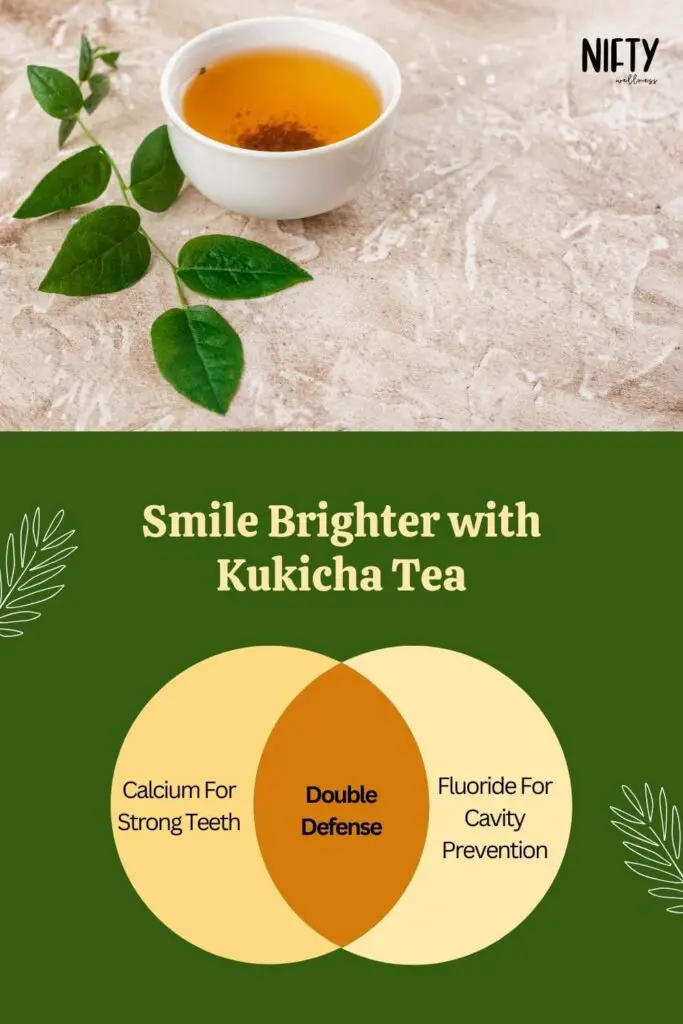
This tea is believed to support dental health. Kukicha contains minerals such as calcium and fluoride that research shows are beneficial for preventing cavities and maintaining healthy bone tissue and tooth enamel. It is said fluoride is essential for strong teeth and preventing tooth decay.
Working side by side, these minerals strengthen the outer surfaces of the teeth that can be weakened by acid. Fluoride is also believed to prevent harmful bacteria and plaque build-up in the mouth. Drinking Kukicha tea in moderation can contribute to maintaining healthy teeth and gums while enjoying its unique flavour and potential health benefits.
Read our latest blog Tea Meditation: Finding Tranquility in Every Sip. Embrace tranquility and mindfulness, one sip at a time, as you indulge in this soothing ritual.
Kukicha Tea Side Effects

In general, consuming Kukicha tea comes with little to no side effects. However, green tea’s high levels of tannins have been linked to hindering iron absorption.
Thus, if you have low iron but still want to enjoy the benefits of Kukicha and other green teas, supplementing with iron-rich foods could be advantageous.
Likewise, drinking twig tea between meals could lessen the effects of hindered iron absorption.
Conclusion
To put it briefly, Kukicha tea offers a unique blend of health benefits. Made from the stems and twigs of the Camellia sinensis tea plant, it’s naturally low in caffeine and packed with nutrients like vitamins, minerals, and L-theanine.
This tea is a powerhouse of antioxidants, including EGCG, which may reduce the risk of chronic diseases. Plus, it supports digestion, dental health, and has a naturally alkalizing effect on the body. While it generally comes with minimal side effects, its tannin content may hinder iron absorption, so it’s essential to consider your individual needs. With its mild, slightly nutty flavour, Kukicha tea is delicious and a wholesome addition to your daily routine. So, go ahead and enjoy a cup of this nourishing tea for a healthier you!
Frequently Asked Questions

How Is Kukicha Tea Made?
Kukicha tea is made using the leftover stalks after the buds and leaves have been harvested to make other teas. The stalks, stems, and twigs are then blended together and uniformly cut. The stems are then withered and dried.
What Does Kukicha Tea Taste Like?
Kukicha brews into a mildly sweet tea that is light yellow in hue. Twig tea’s unique flavor profile consists of a slightly nutty, woody aroma and creamy body.
It has a pleasant taste that can be enjoyed on its own or sweetened with milk and honey.
Are There Other Names For Kukicha?
Kukicha tea is often called bocha, stalk tea, stick tea, or most commonly twig tea.
In Japanese, when Kukicha is made from Gyokuro tea, it is often called “Karigane” or Shiraore.” Kukicha made from Gyokuro is of the highest quality, while Kukicha made from Bancha is considered low quality.
Does Twig Tea Have Caffeine?
Because twig tea or Kukicha is made from the stems and sticks of the Camellia sinensis plant, instead of the caffeine-rich leaves, this tea is relatively low in caffeine.
Twig tea’s caffeine strength is low compared to other drinks, measuring at about 25 milligrams of caffeine in one eight-ounce cup.
This is about 90% less than an eight-ounce cup of coffee, which can have up to 200 mg of caffeine.
What Is The Best Temperature To Brew Kukicha?
Kukicha tea can be made from loose leaf tea or tea bags. The ideal brewing temperature is between 158 to 176 degrees Fahrenheit.
Allow the tea to steep for one to three minutes or longer if you want a more robust flavor. Kukicha is a beautiful tea on its own, but you can sweeten the tea with milk and honey if you like. It can be served either hot or cold.
Is Kukicha Tea Good for You?
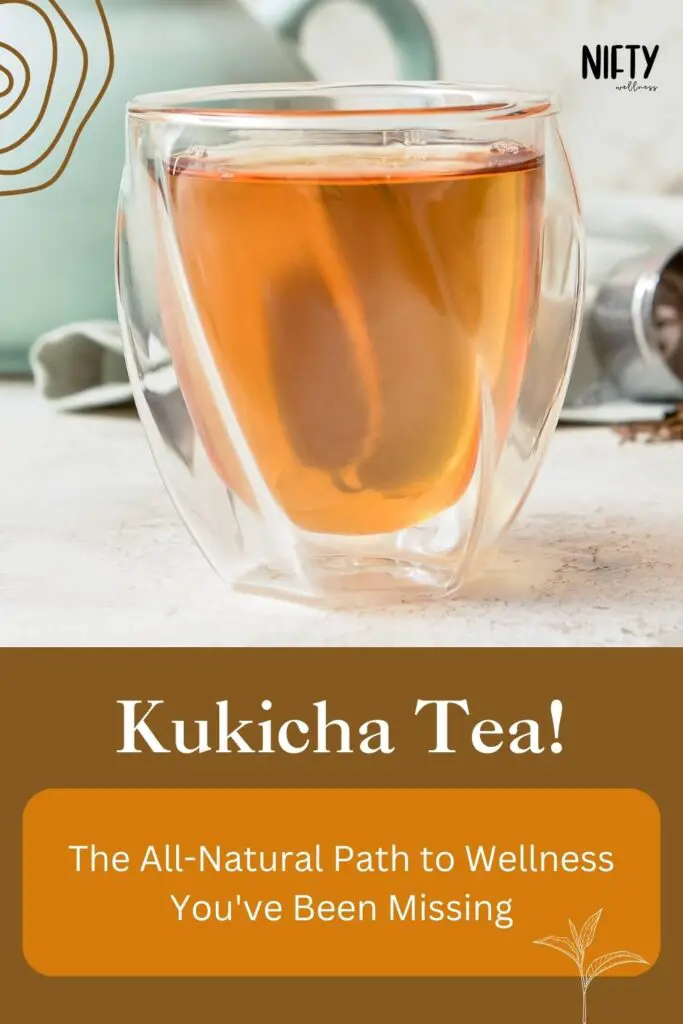
Kukicha is full of nourishing vitamins, minerals, and other natural compounds that promote health and longevity.
Drinking Kukicha tea has been shown to reduce the risk of chronic disease, aid in digestion, support healthy bones and teeth, defend the body against damaging oxidants and free radicals, and naturally alkalize the body.
Kukicha Tea Vs Hojicha Tea
Both Kukicha and Hojicha teas are green teas that belong to the late harvest varieties of Japanese green tea.
Hojicha tea is made from roasted Bancha tea leaves, which alters the tea’s color, flavor, and compounds. Hojicha’s roasting process lowers the amount of caffeine in the tea, similarly to the low-caffeinated Kukicha tea.
Kukicha or twig tea is made from the stems, stalks, and twigs of the tea plant.
What Is Bancha?
Bancha tea is the second most popular Japanese green tea, following Sencha. Bancha is a simple, everyday tea with less caffeine than Sencha or Gyokuro and is typically drunk after a meal to aid in digestion.
How Long Does Kukicha Take to Steep?
You can steep Kukicha tea anywhere between one to five minutes, varying on the type of Kukicha tea. Steeping the tea for less than three minutes will result in a milder taste. Any time above that will result in a stronger flavor.
Is Kukicha Safe To Drink During Pregnancy?
A limited intake of twig tea during pregnancy is considered relatively safe for pregnant women as it offers vitamins, minerals, antioxidants and may help relieve constipation.
However, it is always best to consult with your doctor and other health care advisors before enjoying Kukicha during pregnancy.
